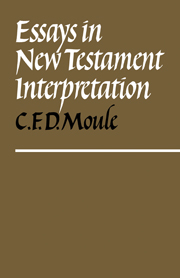Book contents
- Frontmatter
- Contents
- Foreword
- Acknowledgements
- Abbreviations
- Jesus in early Christian interpretation
- Studies in the Gospels
- Two studies in the Epistles
- Two linguistic studies
- Studies exegetical, doctrinal and ethical
- 12 The influence of circumstances on the use of christological terms
- 13 The influence of circumstances on the use of eschatological terms
- 14 St Paul and ‘dualism’: the Pauline conception of resurrection
- 15 A reconsideration of the context of maranatha
- 16 II Cor. iii.18b, καθάπερ ἀπὸ κυρίου πνεύματος
- 17 Punishment and retribution: an attempt to delimit their scope in New Testament thought
- 18 The theology of forgiveness
- 19 Obligation in the ethic of Paul
- 20 ‘…As we forgive…’: a note on the distinction between deserts and capacity in the understanding of forgiveness
- 21 The sacrifice of the People of God
- Index
19 - Obligation in the ethic of Paul
Published online by Cambridge University Press: 05 November 2011
- Frontmatter
- Contents
- Foreword
- Acknowledgements
- Abbreviations
- Jesus in early Christian interpretation
- Studies in the Gospels
- Two studies in the Epistles
- Two linguistic studies
- Studies exegetical, doctrinal and ethical
- 12 The influence of circumstances on the use of christological terms
- 13 The influence of circumstances on the use of eschatological terms
- 14 St Paul and ‘dualism’: the Pauline conception of resurrection
- 15 A reconsideration of the context of maranatha
- 16 II Cor. iii.18b, καθάπερ ἀπὸ κυρίου πνεύματος
- 17 Punishment and retribution: an attempt to delimit their scope in New Testament thought
- 18 The theology of forgiveness
- 19 Obligation in the ethic of Paul
- 20 ‘…As we forgive…’: a note on the distinction between deserts and capacity in the understanding of forgiveness
- 21 The sacrifice of the People of God
- Index
Summary
In The Ethic of Jesus in the Teaching of the Church (New York, 1961; London, 1962), Professor John Knox analyses the dilemma facing the Christian when he recognizes at once the inescapability and the impossibility of the demands of Christ. The demands of Christ are selfauthenticating; they are such that the honest conscience is bound to accept them. And yet they are unattainable. Therefore the Christian is forced into a tension, a tension which would be unendurable – ‘how can we be really obligated to do the impossible?’ (p. 15) – were it not for the accompanying forgiveness which is offered – a forgiveness, however, which, because it is real forgiveness and not a mere forgetting or ignoring, involves not the slightest relaxation of the demand.
This characteristic of the ethic of Jesus – namely, the undiminished costliness of repentance – is described with the writer's usual clarity and feeling, and in an entirely convincing manner. Professor Knox has brought back into view an element in the teaching of Jesus which had tended to be forgotten; and I have no intention of making clumsy attempts to improve on it. It is in connexion with the treatment, in the same book, of Paul's standpoint that I venture to offer some further reflexions. In this part of his argument, Professor Knox reiterates a conclusion which he had expressed some ten years earlier in Chapters in a Life of Paul (New York, 1950; London, 1954), ch. 9.
- Type
- Chapter
- Information
- Essays in New Testament Interpretation , pp. 261 - 277Publisher: Cambridge University PressPrint publication year: 1982
- 1
- Cited by



